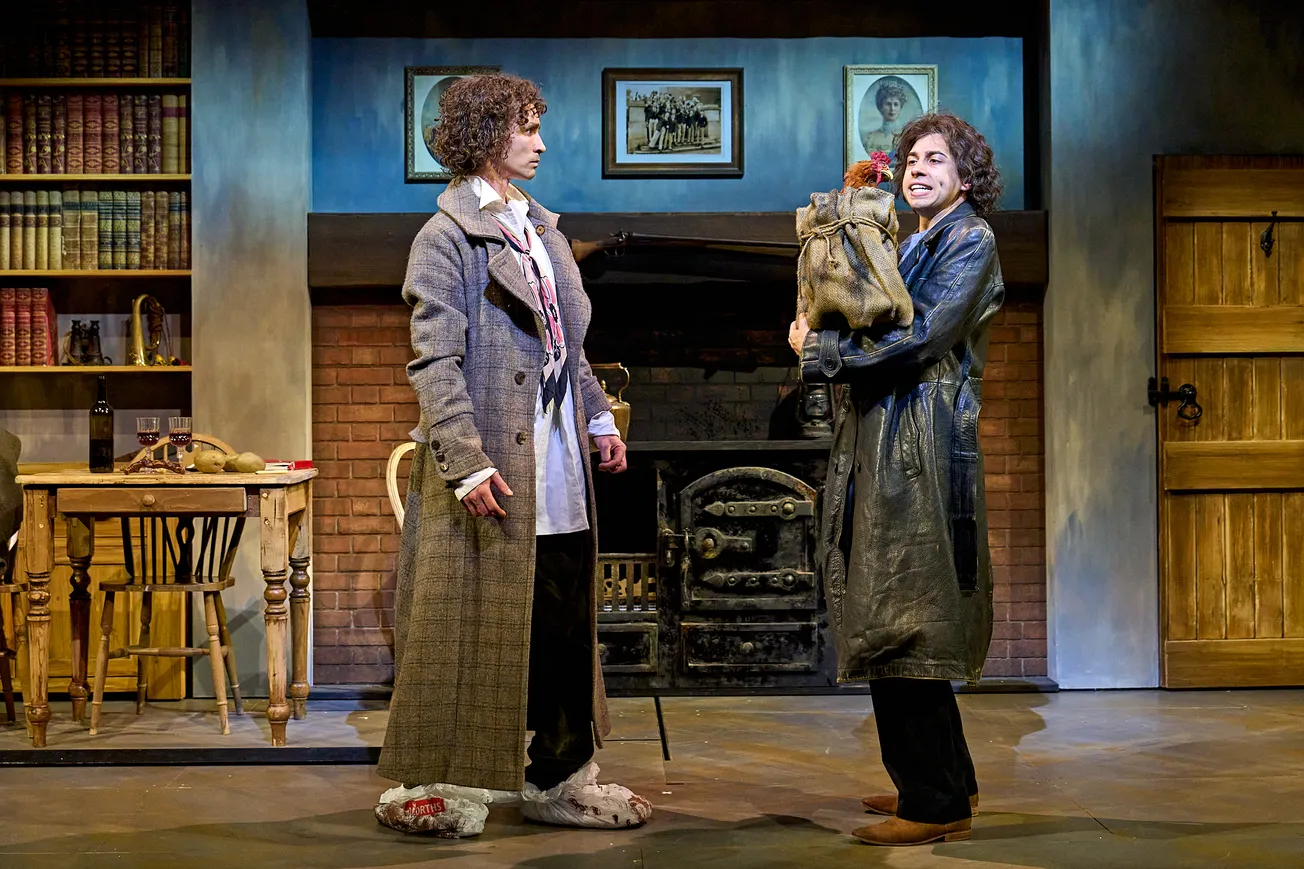Dear Patchers — welcome to your Friday briefing.
Withnail and I is the talk of the city at the moment. The first ever adaptation of the hit 80s film, written by its creator Bruce Robinson, is on at The Rep for another week and a half. You can read our take in the review below — it’s free to access as we will be putting our members-only story out this weekend.
In your Brum in brief there’s more Rep news as the first winner of a major new comedy writing award has been announced. Elsewhere, commissioners at Birmingham City Council have confirmed the IT system of everyone’s nightmares, Oracle, will be completely restarted; a new cycling commissioner is set to be appointed; and our new mayor has his expectations managed.
Finally, Frank Skinner makes a brief homecoming on his current tour that has received rave reviews — and there are tickets left for three shows this weekend. Enjoy!
Brum in brief
🏆Winner, winner: The Rep has announced the first ever winner of its Victoria Wood Playwriting Prize for Comedy. Eugene O’Hare won £25,000 for his two-act play Portugal about a working class woman from Belfast who seeks freedom on the Iberian Peninsula. The award, conceived by The Rep’s Artistic Director Sean Foley, in partnership with The Victoria Wood Foundation and supported by BBC Comedy, is the only major playwrighting award dedicated to comedy. At the ceremony on Wednesday, O’Hare said: “Owning something associated with Victoria’s name is very meaningful to me, and I will treasure it.”
💻Oracle debacle: Birmingham City Council is set to restart its failing IT system that has heavily contributed to the city’s financial crisis. The Oracle software has already cost the authority £100m over four years and an additional £45m is required to get it back into shape — but it won’t be fully operable for another two years, according to officers. Moreover, an audit is still unable to be done for the period after April 2022, leaving external auditors uncertain as to whether or not any fraud has been committed since then. Commissioners, who have been running the council since autumn, said they had come to the “painful conclusion that a re-implementation” of the software is required. More at BirminghamLive.
🚴Active travel appointment: Since walking and cycling comissioner Adam Trantner — who was appointed by former mayor Andy Street — announced earlier this week he will be stepping down, Richard Parker has revealed he intends to retain the role. The Labour mayor said he will be looking for a suitable replacement “as soon as possible”. In other WMCA news, The Dispatch understands officers at the combined authority have had to manage Parker’s expectations around how soon bus franchising can be introduced in the region. We understand the new mayor wanted the buses brought into public control in as soon as six months but it will likely take 12-18 (and four more years to be fully implemented). At least we are all used to waiting for the bus by now.
🎤Skinner, Skinner: One of the West Midlands most famous comedians, Frank Skinner, takes to the stage three times this weekend at the Alexandra Theatre. There are still tickets available for three performances of 30 Years of Dirt. The Times called it “a sparkling tour de force from a craftsman with exquisite control of his art.” Tix at a click.
Losing mirth: Withnail and The Rep
By Kate Knowles
Watching Withnail and I makes you feel dirty. Each scene of the 1987 film adds another layer of grime; by the end, you feel part of the gin-soaked furniture. To watch it is to sink, indulgently, into mirth-laced melancholy. Perhaps this is why the film is so popular with teenagers, discovering it just as they are realising the true misery of the human condition (and maybe experimenting with substances themselves).
The cult classic — newly adapted for the stage by original screenwriter Bruce Robinson and currently showing at The Birmingham Rep — follows two out-of-work, on the dole actors at the fag end of the 1960s. Withnail and Marwood (the titular “I” who is never named), wracked with amphetamine-fuelled anxiety, take off from their rotting London flat for a weekend in the Lake District.

Like the film, the play’s underlying tension rests on the fact that the squabbling pair, who have lived in each other’s pockets for too long, are on the brink of separation. While Withnail, for all his self-professed superiority, is unable to land an audition (he refuses to lower himself to the role of understudy), Marwood is on the edge of securing the gig that will free him from the shackles of their destitute friendship, leaving Withnail embittered and alone.
Withnail delivers Hamlet’s lines, “I have of late—but wherefore I know not—lost all my mirth,” in the play’s poignant final scene in the park after saying goodbye to Marwood in the pouring rain. At 29, he is washed up, his last friend has just left him and this is his only opportunity to “play the Dane”, as his Uncle Monty sorrowfully puts it.
But where the film builds up to this heartbreaking, and necessary release — a moment of sincerity following a crescendo of anxious sardonicism — the play starts with a hysterical tone that is largely sustained throughout. Rather than heightening the drama, it slightly flattens the moments of everyday, humour-inflected horror that stand out acutely in the film.

Without a camera, there is no slow zoom in on Marwood to capture the sense of the walls closing in, or a close up of the yolk spilling grossly from a fried egg sandwich. Instead, the actors have to exaggeratedly gesture to the squalor around them. Marwood, played by Adonis Siddique, brandishes a grotesque, hairy clump of detritus from the sink for the audience to peer at from afar.
On stage, where expression and voice are necessarily bigger, both characters lose some of the subtlety that makes their film counterparts that bit funnier. By contrast, in the film, Marwood expresses his worry in angry outbursts but also in quiet ruminations and nervous, irritable glances. As the straight man of the pair, the delight is in the detail.
Nevertheless, the two leads in the play are talented, although Robert Sheehan as Withnail has a tough job filling Richard E. Grant’s shoes and doesn’t quite achieve the latter’s level of moroseness. Frankly, he looks a little too healthy and could do with a more sallow complexion, darker bags under the eyes. Malcolm Sinclair as Uncle Monty is the show stealer — he plays the lonely and closeted relic with extravagant campness but just enough restraint to avoid becoming a caricature. He is like something from a bygone age.

Always a period piece, it is interesting to watch in the context of Birmingham in 2024. The play’s theme of lost hope resonates. I’m certainly not saying that recent years have been like the swinging sixties, but for a city whose motto is “forward”, we are in the habit of going around in circles.
Last year, the city’s former leader told us we were in for “a golden decade” of opportunity, just months before we were plunged into a financial crisis, then came the biggest local authority cuts ever seen. As in the play, buildings are being torn down and replaced, just as they were in the 60s, with the promise that this will, finally, bring us into a modern and prosperous age.
The class anxiety that permeates the story — “Oh my boys, my boys, we are at the end of an age!” cries aristocratic Monty — has obviously changed in contemporary Britain. But in some ways, we are going backwards. Today it is the Harrow-educated Withnails who are most likely to secure coveted jobs in the arts, not the Marwoods. Moreover, the days of being an artist and signing on are all but over. “Shat on by the Tories and shovelled up by Labour,” continues Monty, neatly prescient of the public mood ahead of this year’s general election.

Bruce Robinson has reproduced his iconic screenplay, loosely based on his own experiences living with a fellow thespian called Vivian Mackerell in his 20s, almost word-for-word. Robinson has said it was Grant who told him to stay close to the text and give the fans what they want. Astute advice, perhaps, but part of the lure of an adaptation is seeing how the material can be reinvented for a different form and time. Indeed, it is a scene that wasn’t included in the film that lifts the first act of the play.
A bored Withnail goads Marwood into an energetic swordfight in the kitchen of the dank country cottage. The standoff underscores the competition at the heart of their relationship. Their styles — Withnail cheats to gain the first blow, Marwood relents but ultimately comes out on top — characterise their differences. Marwood’s win forebodes the story’s tragic ending. It is a satisfying moment — at last, action made for the stage.
But does any of this matter much to an audience which, on both nights I attend the play, is filled with super fans anticipating their favourite lines and laughing raucously? Probably not.
Few people see a play more than once, but a cult film — especially one as quotable as this — is watched over and over until the dialogue forms well-worn grooves in the psyche. That magic doesn’t translate in a direct adaptation for the stage. For the initiated, it is a fun novelty to see your favourite characters come to life again. But I suspect for most people, it won’t deliver the same hit of mirth as a screening of the pure, uncut and original movie.








Comments